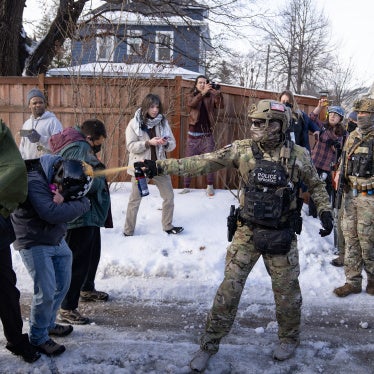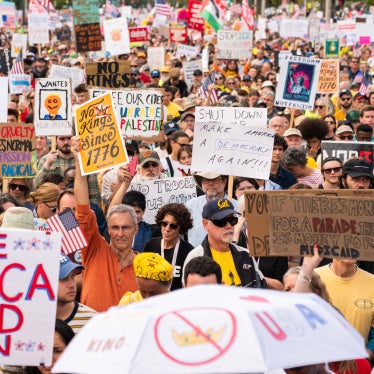In a letter sent to the U.S. Justice Department on February 14, Human Rights Watch's New York Committee called on the agency's Civil Rights Division to insist on significant changes in the New York Police Department (NYPD).
The Justice Department is now reportedly in negotiations with the NYPD and city officials regarding the findings of its "pattern or practice" inquiry, which began after the August 1997 attack by officers on Abner Louima. Under its civil powers, the Justice Department may demand reforms of any department exhibiting a "pattern or practice" of police misconduct.
"Residents of New York City have waited long enough for the police department to set up a real system of accountability," said Domna Stanton, chair of the New York Committee. "It's time for the Justice Department to order significant reforms."
The letter is co-signed by thirty-three prominent New Yorkers, including leading lawyers, financial managers, and academics. All the signatories are supporters of Human Rights Watch, an international monitoring organization based in New York.
The Committee urged the Justice Department to require that the NYPD and the city:
- Provide the Civilian Complaint Review Board (CCRB) with adequate funding, qualified staff, and police department cooperation. CCRB investigators, or other CCRB staff, should be given a meaningful role in the police department's disciplinary process.
- Require transparency of disciplinary actions taken as a result of CCRB-substantiated complaints. Institute increased flexibility for disciplinary sanctions (allowing suspensions beyond thirty days).
- Increase penalties for remaining silent, or providing false information, regarding incidents of brutality or other misconduct.
- Eliminate the "48-hour rule" and other unwarranted impediments to prompt, thorough investigations.
- End the current disconnection between civil lawsuits alleging police misconduct and the police department's force and complaint tracking systems.
- Require that the NYPD clarify how officers are selected for the Street Crime Unit and what kind of special training and supervision they receive to minimize violent encounters as they confiscate weapons.
Mr. Bill Lann Lee
Acting Assistant Attorney General
Civil Rights Division
Department of Justice
10th and Constitution Ave., N.W.
Washington, DC 20530
Dear Assistant Attorney General Lee:
As the New York Committee of Human Rights Watch Council, an organization deeply concerned about police abuse in the United States, we are writing to express our support for your pattern or practice inquiry of the New York City Police Department (NYPD). It is our understanding that your office's Special Litigation Section, together with the U.S. Attorney's Office for the Eastern District of New York, is now negotiating with city and police officials in New York regarding your findings and reform recommendations.
As Human Rights Watch wrote in its July 1998 report, Shielded from Justice: Police Brutality and Accountability in the United States, we believe that your civil powers under the "pattern or practice" statute are essential tools to improve police behavior and oversight. Because the NYPD is the largest police department in the country, and because many incidents of police abuse involving NYPD officers have received national attention, the importance of your inquiry cannot be overstated, both because of the improvements it can bring about in New York City and because of the example it sets for the rest of the country. Indeed, as an organization monitoring human rights around the world, we know that the NYPD's conduct attracts intense attention abroad and, when its conduct fails to meet international human rights standards, exposes the U.S. to condemnations by other countries and undermines U.S. efforts to promote human rights.
We urge you to include the following recommendations as part of your reforms.
- The Civilian Complaint Review Board (CCRB) must be provided with adequate funding, qualified staff, and police department cooperation.
- Mandatory training must be provided for desk sergeants as well as others who may be approached by members of the public who try to file a complaint alleging police abuse. Intimidation, misinformation, or dissuasive tactics must be punished appropriately.
- Require that the transparency of disciplinary actions taken as a result of CCRB-substantiated complaints be improved. Numeric tallies of disciplinary actions are not sufficient -- the NYPD should provide information regarding the discipline imposed for specific incidents of abuse.
- CCRB investigators, or other CCRB staff, should be given a meaningful role in the police department's disciplinary process. As it is, the police department is responsible for administratively prosecuting officers accused of misconduct. Since the involved CCRB personnel are most knowledgeable about the cases they investigate, and because the presence and participation of non-police personnel would lend transparency and credibility to the disciplinary process, the CCRB should be involved.
- The "48-hour rule" and other unwarranted impediments to prompt, thorough investigations should be eliminated.
- Increased flexibility for disciplinary sanctions should be provided. Currently, the Police Commissioner chooses among forfeiture of up to thirty days pay, suspension without pay for up to 30 days, or dismissal. Suspension of an officer should be permitted beyond thirty days. Additionally, the time limit requiring that disciplinary charges be filed within 18 months of the incident in question is unreasonably short and should be extended.
- The current disconnection between civil lawsuits alleging police misconduct and the police department's force and complaint tracking systems should be ended. Civil lawsuits paid by the city on behalf of the police department are at an all-time high, and are certain to continue to increase. During the fiscal year ending in June 1999, the city paid $40 million in taxpayers' dollars in settlements and judgments to plaintiffs alleging police abuse. These amounts should be paid by the police department as part of an effort to force the department to address systemic problems associated with officers who are repeatedly the subject of these lawsuits. Lawsuits should be part of the tracking systems designed to identify "repeat" offenders on the force or those who show signs of becoming abusive. The CCRB, Internal Affairs Bureau, and supervisors of those named in lawsuits should be notified by the city's Law Department. All civil lawsuits filed should become part of the officer's personnel records unless deemed frivolous or patently unfounded by the courts. If a lawsuit claiming brutality or other misconduct is filed and the police department or CCRB has not already investigated the incident in question, an investigation should be opened. Furthermore, if a settlement or judgment is made in favor of plaintiffs, that information should be used to re-consider any complaint that was not substantiated originally.
- The department's tracking systems should be significantly improved, given the findings of the September 1999 interim report of the city's Public Advocate's office regarding "repeat" offenders on the force. It reviewed 420 officers against whom CCRB had substantiated complaints between 1994 and 1997. Of those 420 officers, 306 (or 73 percent) had a prior history of misconduct, with an average of nine allegations in five cases reviewed by the Department prior to the case examined by the Public Advocate's office. One officer had amassed fifty-eight prior CCRB allegations.
- Require that the NYPD clarify how officers are selected for the Street Crime Unit, what kind of special training and supervision they receive to minimize violent encounters as they confiscate weapons, and how citizen complaints, civil lawsuits alleging police misconduct, and criminal charges against officers in this unit compare with the department as a whole.
- Penalties for remaining silent, or providing false information, regarding incidents of brutality or other misconduct should be instituted or increased. The code of silence remains one of the greatest obstacles to investigating allegations of police abuse and holding brutal officers accountable. Officers who provide information honestly and promptly should be rewarded, while superior officers should demonstrate to subordinates that silence will not be tolerated. Police union officials should be penalized for recommending to officers that they obstruct investigations by remaining silent or giving false accounts.
- Your office should oversee a review of standards used by the city's district attorneys' office to ensure that abuse cases rising to the level of criminality are being investigated and prosecuted adequately. The district attorneys' offices should also be required to provide the public with information regarding the number and type of cases considered for prosecution and its reasons for declining to prosecute cases involving alleged police officer misconduct.
We are aware that some of these changes require new negotiations between the city and police unions, but that should not be an insurmountable impediment to improved accountability.
We fully support your efforts to improve police practices and accountability in New York City. Significant changes are clearly needed, and we urge the Justice Department to take this opportunity to help put them into effect, whether through a negotiated consent decree or an injunction. Please note that the business affiliations listed below have been provided for the purpose of identification only. Do not hesitate to contact us if we can be of assistance.
Sincerely,
Domna Stanton
University of Michigan
Chair
Joel Motley
Carmona, Motley, Hoffmann, Inc.
Vice-Chair
Robert Joffe
Cravath, Swaine & Moore
Chair Emeritus
Martin Blumenthal
Blumenthal Trading Corporation
Adrian DeWind
Paul, Weiss, Rifkind, Wharton & Garrison
Irene Diamond
The Irene Diamond Fund
Strachan Donnelley
The Hastings Center
Graham Duncan
Medley Global Advisors
Jonathan Fanton
The MacArthur Foundation
Barbara D. Finberg
MEM Associates
Gail Furman
Child Psychologist
David S. Hirsch
Wertheim Schroder & Co., Inc.
Joseph Hofheimer
Richard Bauer & Co.
Debbie Hymowitz
Gregg Hymowitz
Entrust Capital
Yves-Andre Istel
Rothschild, Inc.
Robert James
Enterprise Development Associates
Nancy Kamel
Ark Development Group
Stephen L. Kass
Carter, Ledyard & Milburn
Douglas Liman
Freelance Motion Picture Director
Vincent McGee
The Irene Diamond Fund
David Nachman
Solomon, Zauderer, Ellenhorn, Frischer & Sharp
Peter Osnos
Board of Directors,
Human Rights Watch
James H. Ottaway, Jr.
Ottaway Newspapers, Inc.
Kathleen Peratis
Board of Directors,
Human Rights Watch
Bruce Rabb
Kramer, Levin, Naftalis & Frankel
Barbara Paul Robinson
Debevoise & Plimpton LLP
Jeffrey Scheuer
The Menemsha Fund
Malcolm B. Smith
General American Investors Company, Inc.
Thomas Sobol
Teachers College, Columbia University
Donald J. Sutherland
Quincy Partners
Eva Timerman
Javier Timerman
Bear, Stearns & Co.








